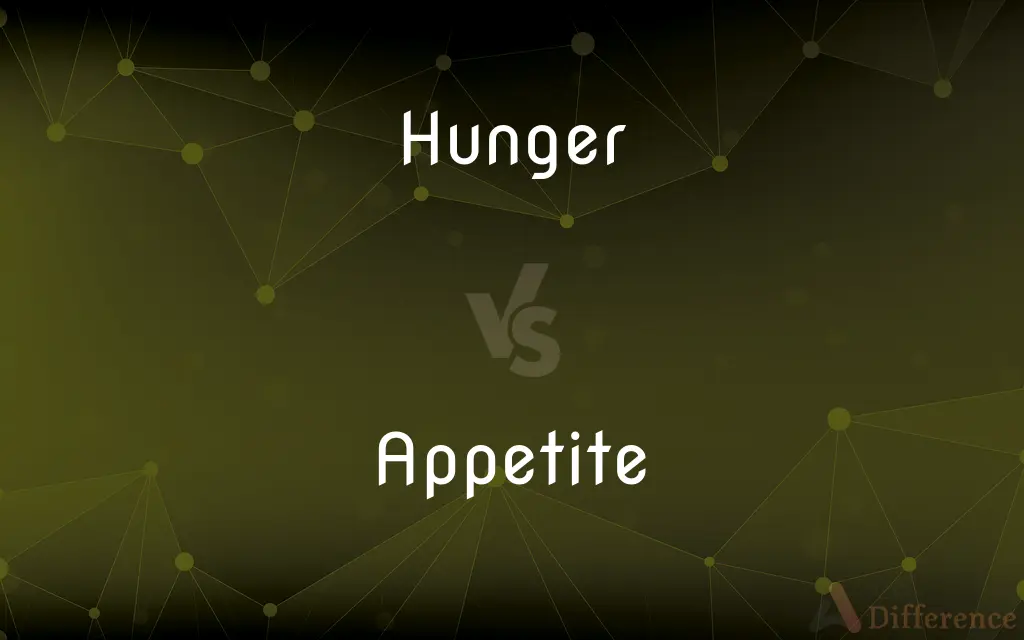Hunger vs. Appetite — What's the Difference?
By Fiza Rafique & Urooj Arif — Published on February 28, 2024
Hunger is a physiological need to eat driven by the body's need for energy, whereas appetite is a psychological desire to eat, often influenced by external factors like sight and smell of food.

Difference Between Hunger and Appetite
Table of Contents
ADVERTISEMENT
Key Differences
Hunger is the body's physical cue signaling the need for energy intake, typically accompanied by physical symptoms like stomach growling, weakness, or lightheadedness. It's regulated by the body's biological mechanisms, including hormonal signals from the digestive system to the brain. Hunger ensures that we consume the calories and nutrients our bodies need to function properly.
Appetite, in contrast, is more about the desire to eat and is often triggered by emotional or sensory stimuli rather than by the body’s actual energy needs. It's influenced by factors such as mood, stress, time of day, and the availability or appeal of food. Appetite can lead to eating when not physically hungry, like craving a specific food or eating out of boredom.
Hunger is a response to the body's energy needs, whereas appetite is closely linked to psychological factors and can be influenced by social and cultural norms. For instance, the sight or smell of food can stimulate appetite even in the absence of true hunger.
Managing hunger typically involves eating nutrient-rich foods that satisfy the body's energy requirements, while managing appetite may require understanding and addressing emotional or situational triggers that lead to eating. For example, practicing mindful eating can help differentiate between hunger and appetite.
The relationship between hunger and appetite is complex, as they can influence each other. For example, a person might feel a reduced appetite when physically full but might still experience hunger if their diet lacks certain nutrients. Conversely, one might not feel physical hunger but can develop an appetite in response to external cues like enticing food advertisements.
ADVERTISEMENT
Comparison Chart
Definition
Physical need to eat for energy.
Psychological desire to eat.
Trigger
Biological signals from the body.
Emotional, sensory, and environmental cues.
Symptoms
Stomach growling, weakness, low energy.
Craving for specific foods, eating out of habit.
Regulation
Hormonal signals and nutrient levels.
Influenced by mood, stress, and external factors.
Management
Eating nutrient-rich, satisfying foods.
Addressing emotional triggers, mindful eating.
Compare with Definitions
Hunger
Physical need for food.
After skipping lunch, his hunger was evident by the stomach growling.
Appetite
Desire to eat food.
The aroma of baking bread triggered her appetite.
Hunger
Driven by energy needs.
Intense hunger set in after her long workout session.
Appetite
Influenced by mood.
He noticed an increased appetite when feeling stressed.
Hunger
Can cause discomfort.
She felt lightheaded from hunger after fasting all day.
Appetite
Not always linked to hunger.
Her appetite for chocolate persisted even after a full meal.
Hunger
Satisfied by eating.
A balanced meal quickly satisfied his hunger.
Appetite
Can lead to overeating.
Despite not feeling hungry, his appetite led him to snack continuously.
Hunger
Necessary for survival.
Hunger signals remind us to provide the body with essential nutrients.
Appetite
Affected by external factors.
Seeing the dessert menu sparked their appetite.
Hunger
A strong desire or need for food.
Appetite
An instinctive physical desire, especially one for food or drink.
Hunger
The discomfort, weakness, or pain caused by a prolonged lack of food.
Appetite
Desire to eat food or consume drink.
Hunger
To have a strong desire or craving.
Appetite
A feeling of craving something.
An appetite for life.
The object of life is to satisfy as many appetencies as possible.
Common Curiosities
What is hunger?
Hunger is the physical sensation and need to eat, typically triggered by the body's requirement for energy and nutrients.
Is it bad to eat when not hungry?
Eating when not physically hungry, particularly if it's a regular occurrence, can lead to an imbalance in energy intake and potentially unhealthy weight gain or nutritional issues.
How can I tell if I'm experiencing hunger or appetite?
Hunger is usually accompanied by physical signs like stomach growling, while appetite is more about craving specific foods without physical hunger cues.
Is it possible to feel hungry after eating?
Yes, if the meal lacks key nutrients or is not sufficiently filling, you might still feel hungry.
How can I manage my appetite to avoid overeating?
Practice mindful eating, understand emotional eating triggers, and ensure a balanced diet to regulate appetite.
How do diet and nutrition affect hunger and appetite?
A balanced diet rich in fiber, protein, and healthy fats can help regulate hunger and reduce unnecessary appetite triggers.
What is appetite?
Appetite is the psychological desire to eat, often influenced by external factors like emotions, environment, and sensory stimuli.
Can appetite lead to weight gain?
Yes, responding to appetite cues in the absence of hunger, especially if it leads to overeating or choosing less nutritious foods, can contribute to weight gain.
Can stress affect hunger and appetite?
Yes, stress can either suppress hunger or increase appetite, leading to changes in eating patterns.
Is skipping meals a good way to control appetite?
Skipping meals can actually increase appetite and lead to overeating later, so it's not recommended for appetite control.
What role does lifestyle play in hunger and appetite?
Lifestyle factors like sleep patterns, physical activity, and stress levels can significantly influence both hunger and appetite.
Can drinking water help with managing hunger and appetite?
Drinking water can help fill the stomach and may temporarily reduce feelings of hunger and appetite.
Can appetite be psychological?
Yes, appetite is often driven by psychological factors, including emotions and sensory responses to food.
How do hormonal changes affect hunger and appetite?
Hormonal fluctuations can increase or decrease both hunger and appetite, influencing eating behaviors and food choices.
What strategies can help differentiate between hunger and appetite?
Mindful eating, waiting before responding to food cravings, and recognizing physical hunger cues can help differentiate between the two.
Share Your Discovery

Previous Comparison
Plain vs. Vanilla
Next Comparison
Dates vs. FigsAuthor Spotlight
Written by
Fiza RafiqueFiza Rafique is a skilled content writer at AskDifference.com, where she meticulously refines and enhances written pieces. Drawing from her vast editorial expertise, Fiza ensures clarity, accuracy, and precision in every article. Passionate about language, she continually seeks to elevate the quality of content for readers worldwide.
Co-written by
Urooj ArifUrooj is a skilled content writer at Ask Difference, known for her exceptional ability to simplify complex topics into engaging and informative content. With a passion for research and a flair for clear, concise writing, she consistently delivers articles that resonate with our diverse audience.
















































